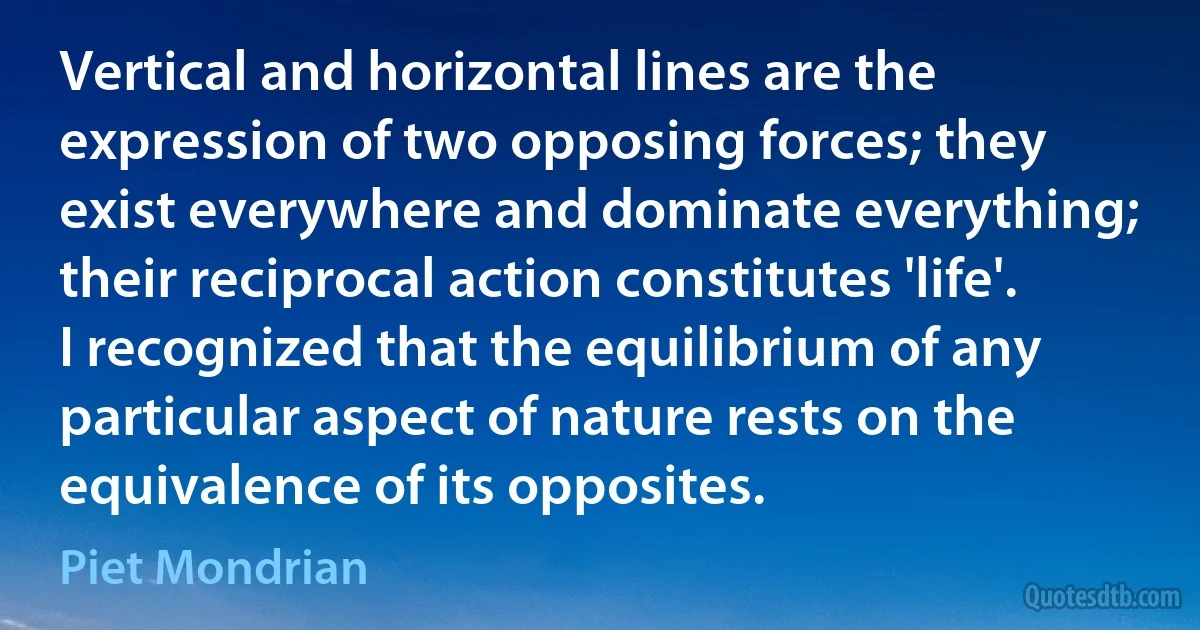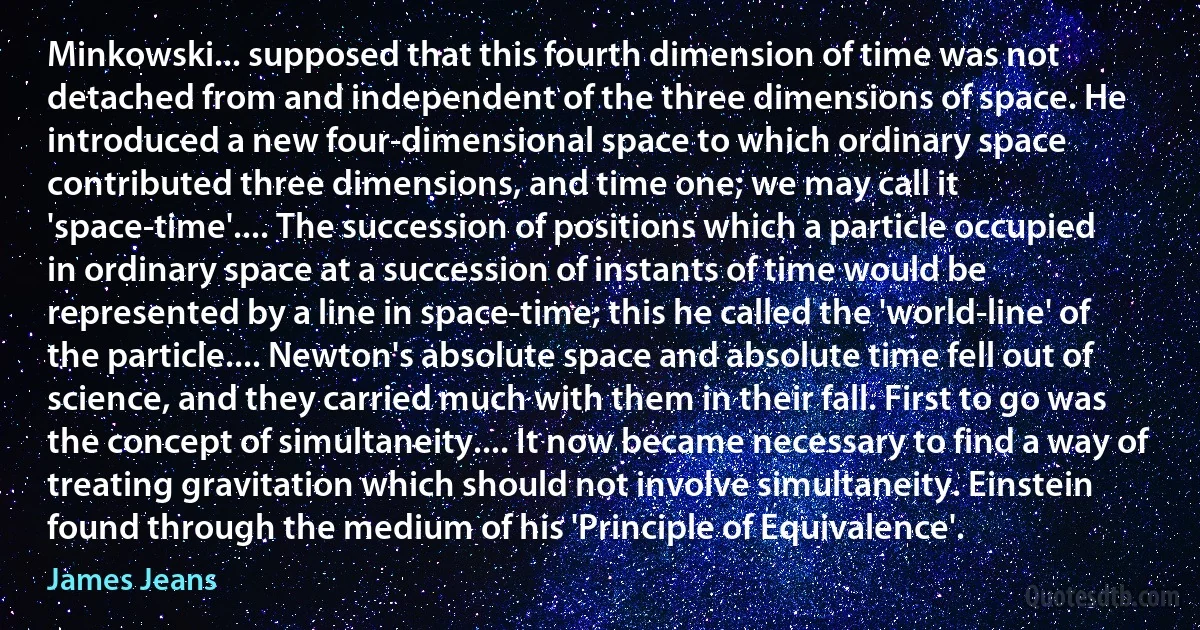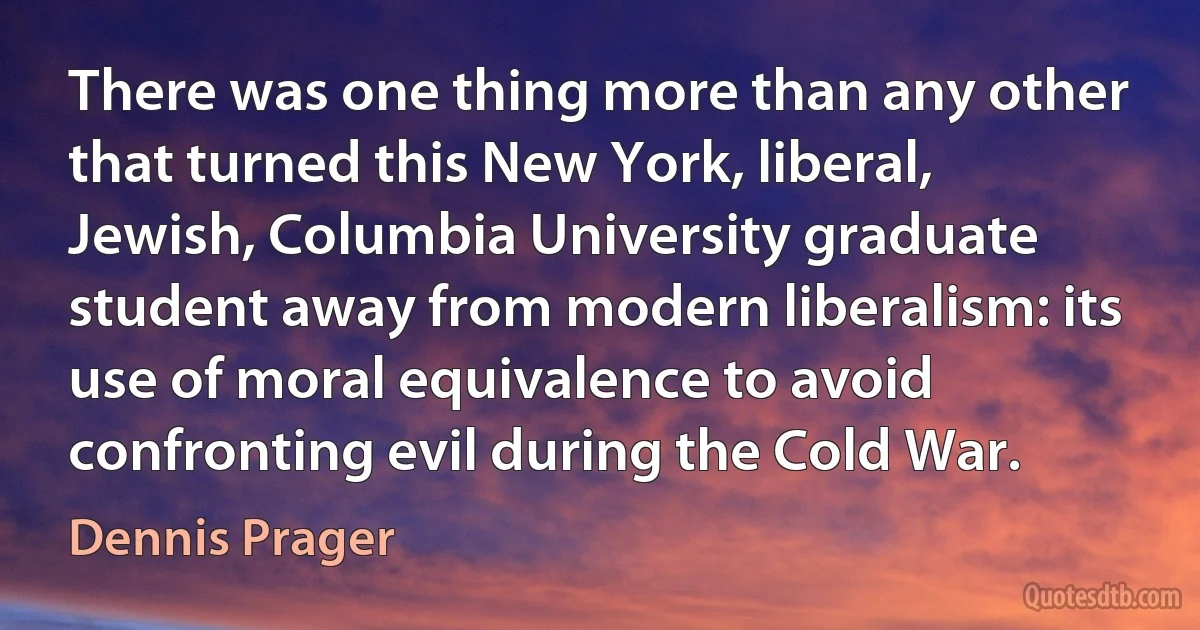Equivalence Quotes
Having red several of your books, I wonder if you [ Rudolf Steiner, the German founder of anthroposophy] could find the time to read my brochure 'Le Néo-Plasticisme', which I am closing. I believe that Neo-Plasticism is the art of the foreseeable future for all true anthroposophists and theosophists. Neo-Plasticism creates harmony through the equivalence of the two extremes: the universal and the individual. The former by 'revelation', the latter by 'deduction'... It was impossible to bring about an equilibrium of relationships other than by destroying the 'form', and replacing it by a new 'universal' expressive means.

Piet Mondrian
I believe that new art must differ totally in its manifestation from art as we know it, and people may be very reluctant to accept this. It is perhaps true to say, as someone did of cubism, that 'To sum up: since art is a need to create rather than imitate, the 'cubists' rousing themselves from the sentimentality born of the picturesque aspect of some natural spectacle or other, disengage the fleeting aspects from those which are constant and absolute, and with the aid of these two elements, construct a reality equivalent to that which they see before them'. Thus it is a question of finding the true equivalence (that, offered by Cubism is still not true equivalence), and this can only be 'that which is not nature at all, and is nonetheless one with nature.

Piet Mondrian
..the equivalence of sounds, gratings, scratches, explosions, shots, blows, hammering, shouts, resonance, echoes in space; meditation of a cosmic theme, reflection for the contemplation of the earth, of magma, of lava, of ash; battlefield; garden; play-field; destiny of the ephemeral.. .Far from the cliché people have of artists holding the baggage of necessary originality, personality, style, etc., that calls for an outsider's discussion of the works, for the author there is, foremost, a nucleus of thought that is more anonymous and collective and of which artists are but humble servants. This is surely the zone where wisdom is deposited, the wisdom that one may really find beneath all ideologies and the contingencies of this world. It is the impulse of our life instinct for knowledge, love and freedom that has been kept and fed by the wisdom of all time.

Antoni Tàpies
Nor do such theories provide a ready account for the equivalence of the slopes of the reaction-time functions for the picture-plane and depth pairs. For, in order to explain the dependence of reaction time on angular difference, we must suppose that the features that are being compared are the features of the two-dimensional drawings, which differ more and more with angular departure, and not the features of the three-dimensional objects, which are the same regardless of orientation.

Roger Shepard
Not all the geometrical structures are "equal". It would seem that the riemannian and complex structures, with their contacts with other fields of mathematics and with their richness in results, should occupy a central position in differential geometry. A unifying idea is the notion of a G-structure, which is the modern version of an equivalence problem first emphasized and exploited in its various special cases by Elie Cartan.

Shiing-Shen Chern
By the time of his Fourth String Quartet, inversional symmetry had become as fundamental a premise of Bartók's harmonic language as it is of the twelve-tone music of Schoenberg, Berg, and Webern. Neither he nor they ever realized that this connection establishes a profound affinity between them in spite of the stylistic features that so obviously distinguish his music from theirs...Nowhere does he [Bartók] recognize the communality of his harmonic language with that of the twelve-tone composers that is implied in their shared premise of the harmonic equivalence of inversionally symmetrical pitch-class relations.

George Perle
Z-relation, or rather, "that certain pitch-class collections share the same 'interval vector' even though they are neither transpositionally nor inversionally equivalent was first pointed out by Howard Hanson in Harmonic Materials of Modern Music (New York: Appleton-Century-Crofts, 1960), p. 22, and by David Lewin in "Re: The Intervallic Content of a Collection of Notes," Journal of Music Theory 4:1 (1960). For a general criticism of Forte's concepts of pitch-class set equivalence see Perle, "Pitch-Class Set Analysis: An Evaluation," Journal of Musicology 8:2 (1990).

George Perle
It is essential to realize at this point that the formalism to be developed, although we cast it initially primarily in the framework of natural systems, is in fact applicable to any situation in which a class of objects is associated with real numbers, or in fact classified or indexed by any set whatever. It is thus applicable to any situation in which classification, or recognition, or discrimination is involved; indeed, one of the aims of our formalism is to point up the essential equivalence of the measurement problem in physics with all types of recognition or classification mechanisms based on observable properties of the objects being recognized or classified.

Robert Rosen
The higher conception of "no revenge for wrongs," and of freely giving more than one expects to receive from his neighbours, is proclaimed as being the real principle of morality - a principle superior to mere equivalence, equity, or justice, and more conducive to happiness. And man is appealed to to be guided in his acts, not merely by love, which is always personal, or at the best tribal, but by the perception of his oneness with each human being. In the practice of mutual aid, which we can retrace to the earliest beginnings of evolution, we thus find the positive and undoubted origin of our ethical conceptions; and we can affirm that in the ethical progress of man, mutual support - not mutual struggle - has had the leading part. In its wide extension, even at the present time, we also see the best guarantee of a still loftier evolution of our race.

Peter Kropotkin
Moral equivalence is a term of propaganda that was invented to try to prevent us from looking at the acts for which we are responsible. ...There is no such notion. There are many different dimensions and criteria. For example, there's no moral equivalence between the bombing of the World Trade Center and the destruction of Nicaragua or of El Salvador, of Guatemala. The latter were far worse, by any criterion. So there's no moral equivalence.

Noam Chomsky



